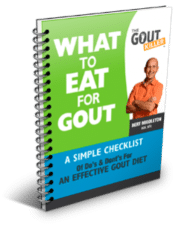If I had to guess, you’re here now because you’re trying to figure out what to eat for gout, right? I couldn’t stand it anymore so I had to write this post about nutrition for gout – there is SO much bad information out there.
First of all, let me thank you for being here and being proactive about improving your health with commonsense about what a gout diet should really be…BUT, it’s more than just what you eat – it’s more about how your body is absorbing and utilizing the food you eat.
What Should I Eat for Gout?
What foods you should eat for gout is not exactly the right question. The more appropriate question is what food sources do you need to take advantage of to clear up your nutritional deficiencies…that are resulting in gout! There is definitely a key element of knowing what gout foods to avoid to keep that horrendous pain from revisiting.
It is of prime importance to understand that it is likely the foods that you are eating now and have been consuming for many years, that are contributing to your problem with gout…and high blood pressure, diabetes, being over-weight and a wide variety of other poor health conditions.
There are two things that you can do in the realm of diet and foods to start to bring yourself around and make your gout disappear…actually three:
- Stop eating sugar
- Stop eating bread (in any form)
- Start drinking more water
Sugar and bread are pretty much the same thing – only bread is probably worse. Modern day bread IS sugar…only worse because most of it also has some form of hydrogenated trans fatty acids.
I’m going to make this quick:
- Sugar is fast, quick energy. The body turns it into glucose and uses it immediately…if it needs it. If it doesn’t need it, it stores it as glycogen in the liver and muscle tissues for later. If THOSE stores are full, glucose is converted to triglycerides (fat) and stored in the adipose tissue – the fat cells! “Fat” doesn’t make you fat – “Carbs/Sugar” does! It’s a well-know fact – the more over-weight you are, the more likely you are to have a problem with excess uric acid.
- The second point to make is that the cells of our bodies are made from the molecules of the food we eat. If you remember back (or go and Google it), the cell membrane is made of a “phospholipid bi-layer” …”lipid” …i.e. FAT. We need fat. REAL fat.When you eat hydrogenated fats and oils that are in EVERY processed food, (anything that comes in box, bag, can, or bottle) it’s like eating plastic. Then the structure of the membrane of your cells start to be made of it…and they don’t work so good any more. AND, the body just plain doesn’t know what to do with – it’s FAKE!
Moving on – we have more to cover.
Hi Bert
To my pleasant realization, your program is useful, meaningful, thoughtful and comprehensive. At his date I am 80% effective with an achievable 100% in my glorious mind.
Since beginning the program I have purchased and read The Water Cure (we are observing this carefully) and I have Alkalize or Die on order. I have also purchased a month’s worth of chocolate (for trial purposes). We have also become habituates of the natural foods grocers in Steamboat so more of our produce and other grocery products are coming from that location.
Stress is a precipitator in my case and so I am taking steps to alleviate this through adjustments to TV habits, meditation, and elimination of some pain-in-the-ass guests. Exercise has been a problem with feet that work, but not well. As they improve so will these regimens.
In addition to my daily intake of vitamins I am using Devil’s Claw and Montmorency Cherry Flex concentrated cherry pills. I would welcome your thoughts, if any, on these.
Finally, it is my goal to move back off of the Gout Edge and down from an 8-9 rating to 1-2. I believe this will require more time and attention to my 7 step program.
While you are in Salida and we are in North Park, you will appreciate that activities are more available in summer than in winter. But when there is deep snow around, high wind and bitter wind chill I expect to be indoors by the fire after shoveling the walkways and bringing in the firewood. I do have free weights to enable some serious aerobic exercise but would welcome additional exercise thoughts.
You have my heartfelt thanks for producing both the ideas and the positive momentum for a better, more normal, life.
Sam
. . .
Nutrition for Gout 101
This is actually nutrition for good health in general and when you’re healthy you don’t get gout – so let’s get healthy. There are four macro-nutrients and two micro-nutrients:
- Water – makes up 60% of the body
- Proteins – make up 18%
- Fats – make up 15%
- Carbohydrates – make up 2%
- Minerals – make up 4%
- Vitamins – make up less than 1%

Water
Water does a lot of really important things in the body and a few of the most important ones are to provide optimal oxygen and nutrient delivery to the cells, flush and remove wastes and toxins, and it is fundamental to the body’s natural healing process. Drink half you body weight in ounces of high-quality water every day.
Proteins (25% of daily caloric intake)
Proteins are the building blocks of the body, assembling to form all the tissues, and provide structure. Enzymes, hormones, hemoglobin and antibodies are all proteins. Protein in a gout diet can be tricky but get high-quality, organically grown/raised sources of grass-fed beef, wild-caught fish, free-range chicken, and sources of whole raw dairy.
Fats (25% of daily caloric intake)
As we discussed earlier, fats are what we are made out of. The biggest scam the world has ever known is the myth of, “eating fat equals being fat” – nothing could be further from the truth.
“Low-fat” is a complete and total myth. Fats are the preferred source of fuel for the body to make energy from. It’s long-lasting, slow-burning fuel. Fat slows down the absorption of food, is the material that the cell membranes are made out of, a source of the fat-soluble vitamins, and it just plain makes food taste better.
There are three kinds of fats and you should strive to get some of each every day. They are: Saturated Fat, Monounsaturated Fat, and Polyunsaturated Fat.
- Good sources of saturated fat are: Butter from pasture-fed cows, coconut oil, and grass-fed beef
- Good sources of monounsaturated fats are: Extra virgin olive oil, walnut oil, and nuts like cashews and pecans
- Good sources of polyunsaturated fats are: Flax oil and sesame oil
Saturated fats are the most stable, solid at room temperature, and the best for cooking and frying. Monounsaturated fats are liquid at room temperature but turn solid in the refrigerator – they can be used for light cooking and sauteing and for salads. Polyunsaturated fats are delicate, the least stable, and go rancid easily. Use sparingly and keep out to of the light and in the refrigerator.
Learn more about “good fats” and “bad fats” from HelpGuide.org.
Carbohydrates (50% of daily caloric intake)
Carbohydrates are important in the body…IF you take advantage of the right forms of carbohydrates. They are quick fuel for the brain and muscles. They provide fiber and assist in efficient elimination. They also help to lubricate the joints and fight infection. Get your carbohydrates from whole organically grown sources like kale, broccoli, and chard.
While fruits are a source of sugar in the form of carbohydrates, two or three pieces of whole fruit per day is helpful for gout. Apples and cherries are among the best.
Minerals
Minerals are needed as helpers for all kinds of metabolic reactions in the body – they are essential for breaking down different molecules of foods sources and are also important as catalysts to putting different molecules together to synthesize nutrients made by the body. They are are needed for proper pH balance in the body, the transference of nutrients across the cell membrane, regulate tissue growth, and help the muscles to contract and relax.
Minerals cannot be synthesized by the body, they have to come from the food we eat. Sea salt is an excellent source of minerals as well as all properly raised and prepared, nutrient-dense, whole foods.
Vitamins
Vitamins also cannot be made by the body and have to be sourced from the foods in our diets. An important part of nutrition for gout, vitamins play several roles in the body: They assist in facilitating metabolic reactions, help with resistance to disease, promote easier elimination, and assist in more complete digestion. Like minerals, vitamins are best found in properly raised and prepared, nutrient-dense, whole foods.
☆ Remember! Healthy nutrition for gout comes from your wise choices in whole foods that you prepare yourself.

“I know your pain. Let me help you kill your gout for good! And teach you to advocate for yourself and take ownership of your gout recovery, by showing you how to live the gout-free lifestyle.” Two decades ago, Bert Middleton found himself diagnosed with gout. Like 8.3 million other people in the United States (approximately 4% of the population), he struggled helplessly with the physical, emotional, social, and financial impact that gout left unchecked can have on your life. Prescription drugs were of limited help… And the terrible pain of regular gout attacks left him unable to enjoy even the simplest daily pleasures. His marriage was suffering. His finances were spiraling due to the impact gout had on his ability to work. And maintaining a social life was often nearly impossible. Tophi surgeries left him in terrible pain. And he found himself depressed … and angry … that gout was stealing years of his life.
Until one day, after hundreds of hours of research and self-experimentation, Bert finally had a breakthrough and created a blueprint for a way of living that would prove to be “the answer” to living gout-free for nearly a decade now. Today, Bert and his “Gout Wife” Sharon devote their evenings and weekends to educating other gout sufferers on how to live the gout-free lifestyle. Showing others his 911 Emergency Response Gout Recovery Plan for getting PAINFUL gout attacks under control in as little as 4 hours. And then, how to make daily choices that keep gout under control for GOOD! So you can finally start LIVING again!

